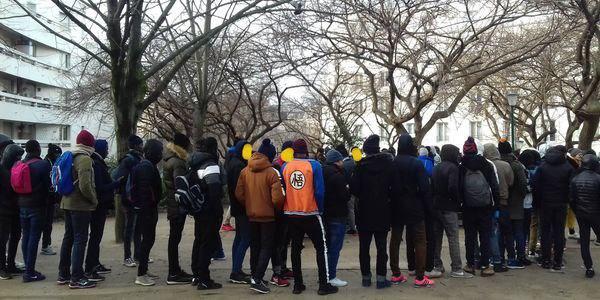
The French Administrative Court suspended the order banning the distribution of food in specific areas of the 10th and 19th arrondissements of the capital, Paris, about three weeks after the decree was issued.
The “Utopia 56” association, the Human Rights League, and the “Union of Solidarity Activists”, which filed an appeal before the Administrative Court, welcomed this decision.
“This is what we were hoping for, we are very happy with this decision,” says Oceane Marache, coordinator of Utopia 56 Paris. “Although it was crazy to reach this point, and to have to devote our energy to resorting to the law, instead of our solidarity actions.” According to the “InfoMigrants” website.
The police prefecture’s decision, which came into effect on Tuesday, October 10, indicated that food distribution operations “contributed to stimulating the formation of camps in the Boulevard de la Villette area, where migrants, drug addicts, and the homeless are present.”
The police leadership also highlighted the security aspect to defend its decree, which spoke of “gatherings,” “road violations,” the presence of “drug addicts,” and “disturbing public order.” This measure was scheduled to be in effect until November 10.
For Philippe Caro, a member of the Wilson Migrant Solidarity Group, attacking a basic need like food against people who “already have nothing left” is “despicable.” He continued, “This is the reception policy in France, leaving people on the street and depriving them of eating and drinking.”
In the decision issued on October 18, the court judge considered that the disturbance of public order that the police director invoked to justify the legality of the decree “had not been proven,” according to the press release issued by the Administrative Court. It also emphasized that the ban “is not necessary to maintain public order.”
Despite this “good news,” associations remain concerned. “As the Olympics approach, we fear that such formal decrees will multiply,” explains Oceane Marache. “The authorities consider that these food distributions encourage the formation of informal camps, which is not true. I hope we will not reach the situation that Calais has been in in recent years.”
Similar orders were published to prevent food distribution at the end of 2020 to avoid so-called “migrant settlement points” in the city, which are places where migrants gather and sometimes settle. “Utopia 56” denounced in a statement, saying, “In addition to developing fear, loneliness, fatigue, hunger, and thirst among people in the streets, this policy has the effect of increasing cases of violence, homelessness, distress, and extreme fragility, and this without providing any real solution.”
In September 2022, after two years of obstruction, the Lille City Court finally put an end to these orders taken in Calais, deeming them “manifestly inappropriate and disproportionate.”





